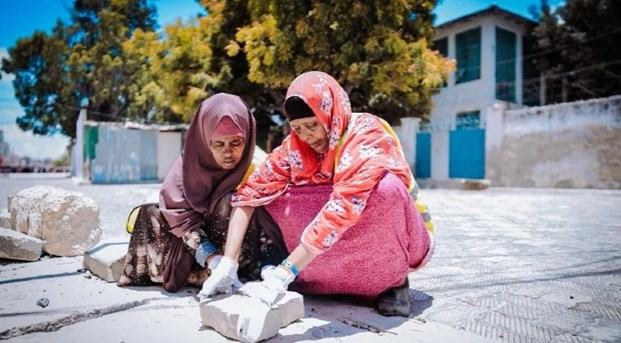
Friday June 13, 2025

In Somalia, women are often expected to adopt traditional roles, but that is changing. Photo: Hussein Mohamed/World Bank
Mogadishu (HOL) — Just after fajr prayers, Mogadishu’s Shangaani district begins to stir. The low grind of asphalt rollers competes with the clatter of metal tools. In the orange dust, two Somali women move with practiced ease across the worksite in reflective vests and worn boots—part of a World Bank-funded project that is rewriting not only roads, but gender roles.
“I grew up in a society where women were expected to take on traditional roles, caregiving, teaching, or running small businesses,” said Farhiya Abdikadir Mohamed, brushing dust from her sleeve. “I was always interested in how things were built and watched the men working on roads, wondering why women weren’t part of it.”
She isn’t wondering anymore.
Farhiya and Halima are among 583 women hired under the World Bank-backed Somalia Urban Resilience Project – Phase II, known locally as the Nagaad Project. Co-financed by the Somalia Multi-Partner Fund, it’s rebuilding urban infrastructure across Mogadishu, Garowe, Baidoa, Kismayo, Dhusamareeb and Beledweyne—and in the process, reshaping what labour looks like in post-conflict Somalia.
So far, the project has reached nearly 495,000 people—51% of them women. It has paved 34 kilometres of roads lined with solar lights and drainage systems, constructed a 145-meter bridge, and rehabilitated flood canals. Another 53 kilometres are under construction. Its drought response work has reached over 1 million people, the vast majority displaced and female.
But for Halima, statistics don’t matter much. What matters is rent money. And school fees. And food.
“When I heard about the opportunity to work in construction, I wasn’t sure I could do it,” said Halima, a mother of seven who had worked as a tea seller, cleaner and tailor. “But I had no other choice. My children needed me to be strong.”
She remembers the first day clearly. “The first time I picked up a shovel, some men laughed,” she said. “They said I wouldn’t last a week!”
She lasted. So did Farhiya.
“I convinced myself that if men could do it, I could succeed too,” Farhiya said. Her tone isn’t defensive—just steady, like someone who no longer needs to explain herself.
At first, the work was punishing. The heat, the weight of tools, the glances. But over time, something shifted. The same men who once watched with skepticism began nodding in respect.
“They no longer see us as women trying to do a man’s job,” said Farhiya. “They see us as fellow workers.”
The Nagaad Project trained them in asphalt laying, machinery operation and safety. The skills gave them employment. The work gave them something else: independence.
“This job gave me life and hope,” said Halima. “I don’t worry about how I’ll feed my kids.”
Mohamed Sheikh Ahmed, a community engagement specialist with the Banaadir Regional Administration, said he’s seen the shift firsthand.
“Halima and Farhiya are among the hardest workers,” he said. “They’ve proven that women can do this job just as well as men. This is not just about roads or employment, it’s about shifting mindsets and building a future where gender does not limit potential.”
Both women have begun mentoring others. Farhiya hopes to become a site supervisor. Halima wants to train women who never thought they could do this work.
“I want to be an example to show that women can rise to the top in any field,” Farhiya declared.
In their neighbourhoods, their reputations have changed. “My neighbours used to say construction wasn’t for women,” Halima said, shaking her head. “Now, they ask me how to join!”
She grinned before walking back toward the site, where the road glinted beneath the sun.
“There’s no such thing as ‘men’s work’ or ‘women’s work’,” she said. “If you have the skill and determination, you can do anything.”
And on this stretch of road in Mogadishu, they already have.